 | |
| Author | Joel Waldfogel |
|---|---|
| Genre | Nonfiction |
| Publisher | Princeton University Press |
Publication date | 2009 |
| Pages | 173 |
| ISBN | 978-0-69-114264-7 |
| OCLC | 310171808 |
Scroogenomics is a non-fiction book written by the economist Joel Waldfogel. [1]
 | |
| Author | Joel Waldfogel |
|---|---|
| Genre | Nonfiction |
| Publisher | Princeton University Press |
Publication date | 2009 |
| Pages | 173 |
| ISBN | 978-0-69-114264-7 |
| OCLC | 310171808 |
Scroogenomics is a non-fiction book written by the economist Joel Waldfogel. [1]
In his book Waldfogel argues that purchasing gifts for other people is a "terrible way to allocate resources" as a result of gift givers' lack of knowledge of the recipients' true preferences. [2] Waldfogel estimates that approximately $12 billion a year in the U.S. and $25 billion a year worldwide is misallocated in Yuletide giftgiving, which he calls "an orgy of wealth destruction". [3] [4] [5]

Christmas is an annual festival commemorating the birth of Jesus Christ, observed primarily on December 25 as a religious and cultural celebration by billions of people around the world. A feast central to the Christian liturgical year, it is preceded by the season of Advent or the Nativity Fast and initiates the season of Christmastide, which historically in the West lasts twelve days and culminates on Twelfth Night. Christmas Day is a public holiday in many of the world's nations, is celebrated religiously by a majority of Christians, as well as culturally by many non-Christians, and forms an integral part of the holiday season organized around it.
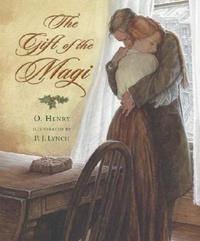
"The Gift of the Magi" is a short story by O. Henry first published in 1905. The story tells of a young husband and wife and how they deal with the challenge of buying secret Christmas gifts for each other with very little money. As a sentimental story with a moral lesson about gift-giving, it has been popular for adaptation, especially for presentation at Christmas time. The plot and its twist ending are well-known, and the ending is generally considered an example of comic irony. It was allegedly written at Pete's Tavern on Irving Place in New York City.

A gift or a present is an item given to someone without the expectation of payment or anything in return. An item is not a gift if that item is already owned by the one to whom it is given. Although gift-giving might involve an expectation of reciprocity, a gift is meant to be free. In many countries, the act of mutually exchanging money, goods, etc. may sustain social relations and contribute to social cohesion. Economists have elaborated the economics of gift-giving into the notion of a gift economy. By extension the term gift can refer to any item or act of service that makes the other happier or less sad, especially as a favor, including forgiveness and kindness. Gifts are also first and foremost presented on occasions such as birthdays and holidays.

Georgism, also called in modern times geoism and known historically as the single tax movement, is an economic ideology holding that, although people should own the value they produce themselves, the economic rent derived from land – including from all natural resources, the commons, and urban locations – should belong equally to all members of society. Developed from the writings of American economist and social reformer Henry George, the Georgist paradigm seeks solutions to social and ecological problems, based on principles of land rights and public finance which attempt to integrate economic efficiency with social justice.

Foreign Policy is an American news publication, founded in 1970 and focused on global affairs, current events, and domestic and international policy. It produces content daily on its website, and in six print issues annually.
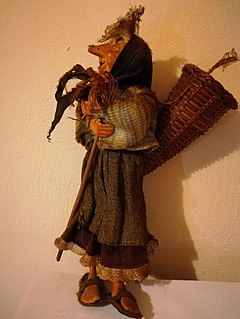
In Italian folklore, Befana is an old woman who delivers gifts to children throughout Italy on Epiphany Eve in a similar way to St. Nicholas or Santa Claus.

Ded Moroz is a legendary figure similar to Saint Nicholas, Father Christmas and Santa Claus who has his roots in Slavic mythology. The tradition of Ded Moroz is mostly spread in East Slavic countries and is an important part of Russian culture. Although at the beginning of the Soviet era communist authorities banned Ded Moroz he soon became an important part of the Soviet culture. The literal translation is "Grandpa Frost".

The Christmas season, also called the holiday season, or the festive season, is an annually recurring period recognized in many Western and other countries that is generally considered to run from November to early January.

Santa Claus, also known as Father Christmas, Saint Nicholas, Saint Nick, Kris Kringle, or simply Santa, is a legendary character originating in Western Christian culture who is said to bring gifts on Christmas Eve of toys and candy to well-behaved children, and either coal or nothing to naughty children. He is said to accomplish this with the aid of Christmas elves, who make the toys in his workshop at the North Pole, and flying reindeer who pull his sleigh through the air.

Lori Foster is a best-selling American writer of over seventy romance novels. She also writes Urban Fantasy novels using her first and middle initials, L.L. Foster.Since first publishing in January 1996, Foster has become a USA Today, Publishers Weekly and New York Times bestselling author. Lori has published through a variety of houses, but is currently with Harlequin.
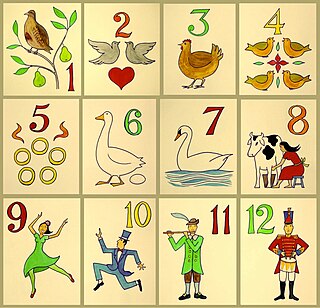
"The Twelve Days of Christmas" is an English Christmas carol that enumerates in the manner of a cumulative song a series of increasingly numerous gifts given on each of the twelve days of Christmas. The song, published in England in 1780 without music as a chant or rhyme, is thought to be French in origin. "The Twelve Days of Christmas" has a Roud Folk Song Index number of 68. The tunes of collected versions vary. The standard tune now associated with it is derived from a 1909 arrangement of a traditional folk melody by English composer Frederic Austin, who introduced the familiar prolongation of the verse "five gold rings".
Virtual goods are non-physical objects and money purchased for use in online communities or online games. Digital goods, on the other hand, may be a broader category including digital books, music, and movies. Virtual goods are intangible by definition.
The estate tax in the United States is a tax on the transfer of the estate of a person who dies. The tax applies to property that is transferred by will or, if the person has no will, according to state laws of intestacy. Other transfers that are subject to the tax can include those made through a trust and the payment of certain life insurance benefits or financial accounts. The estate tax is part of the unified gift and estate tax in the United States. The other part of the system, the gift tax, applies to transfers of property during a person's life.
Terry Spear born in Sacramento, California, is an American author who specializes in writing paranormal romance novels and medieval romance novels for both adults and teen audiences. Her werewolf paranormal romance series started with Heart of the Wolf which Publishers Weekly named as one of their Best Books of the Year, 2008. She is also the author of the jaguar shifter series, Heart of the Jaguar which started in 2012 with the novel Savage Hunger and the cougar shifter series, Heart of Cougar which is self-published.
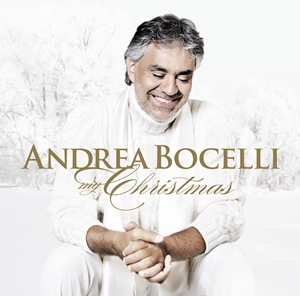
My Christmas is the thirteenth studio album and first Christmas album released by Italian tenor Andrea Bocelli.
MacKenzie Scott is an American billionaire businesswoman, novelist, and philanthropist. As of May 29, 2021, she has a net worth of US$57.0 billion, owing to a 4% stake in Amazon, after her divorce from Amazon founder and former Chief Executive Jeff Bezos. As such, Scott is the third-wealthiest woman in the United States, and the 21st-wealthiest individual in the world. She is known for her involvement in the founding and development of Amazon, as well as her now dissolved marriage to Bezos. She is a signatory to the Giving Pledge, a commitment to give at least half of her wealth to charity. In 2020, she made US$5.8 billion in charitable gifts, one of the largest annual distributions by a private individual to working charities. Scott donated a further $2.7 billion in 2021.
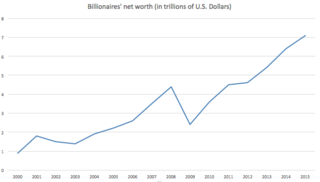
The World's Billionaires is an annual ranking by documented net worth of the wealthiest billionaires in the world, compiled and published in March annually by the American business magazine Forbes. The list was first published in March 1987. The total net worth of each individual on the list is estimated and is cited in United States dollars, based on their documented assets and accounting for debt and other factors. Royalty and dictators whose wealth comes from their positions are excluded from these lists. This ranking is an index of the wealthiest documented individuals, excluding any ranking of those with wealth that is not able to be completely ascertained.

The economics of Christmas is significant because Christmas is typically a peak selling season for retailers in many nations around the world. Sales increase dramatically as people purchase gifts, decorations, and supplies to celebrate. In the U.S., the "Christmas shopping season" starts as early as October. In Canada, merchants begin advertising campaigns just before Halloween, and step up their marketing following Remembrance Day on 11 November. In the UK and Ireland, the Christmas shopping season starts from mid November, around the time when high street Christmas lights are turned on. In the United States, it has been calculated that a quarter of all personal spending takes place during the Christmas/holiday shopping season. Figures from the U.S. Census Bureau reveal that expenditure in department stores nationwide rose from $20.8 billion in November 2004 to $31.9 billion in December 2004, an increase of 54 percent. In other sectors, the pre-Christmas increase in spending was even greater, there being a November–December buying surge of 100 percent in bookstores and 170 percent in jewelry stores. In the same year employment in American retail stores rose from 1.6 million to 1.8 million in the two months leading up to Christmas.

A Christmas gift or Christmas present is a gift given in celebration of Christmas. Christmas gifts are often exchanged on Christmas Day itself, December 25, or on the last day of the twelve-day Christmas season, Twelfth Night. The practice of giving gifts during Christmastide, according to Christian tradition, is symbolic of the presentation of the gifts by the Three Wise Men to the infant Jesus.